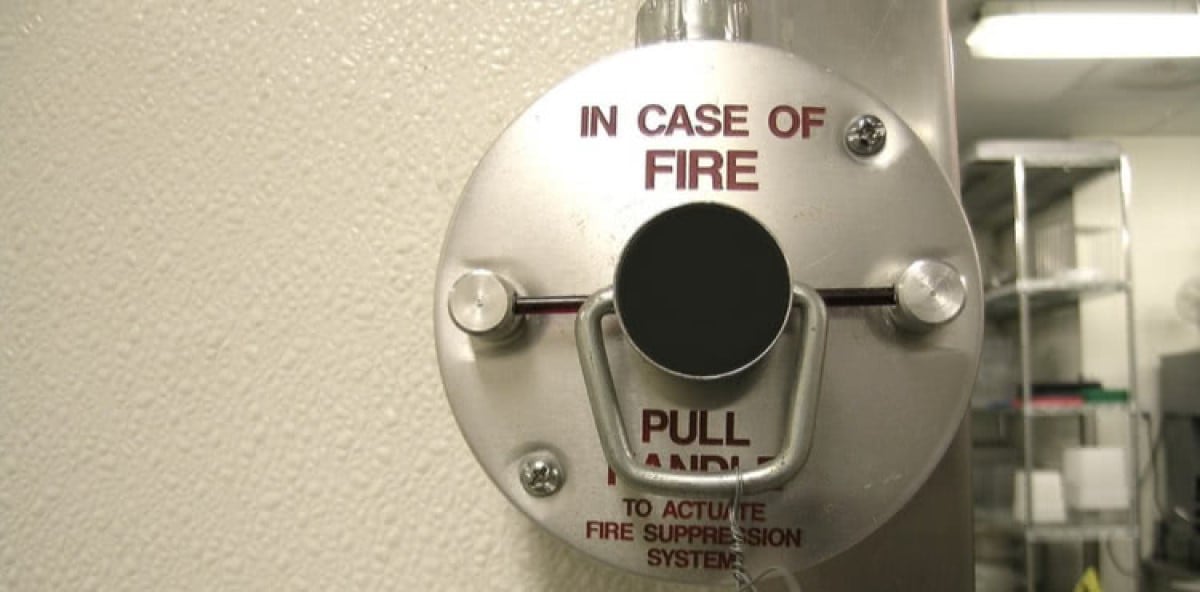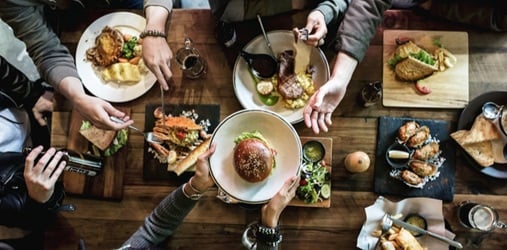Commercial kitchen fire safety for restaurant owners

When restaurant owners and owners of other food services businesses start researching property insurance, they often come across a lot of jargon that leaves them scratching their heads and wondering why buying insurance is so complicated.
As part of Insureon’s ongoing efforts to make business insurance easier to understand, we’re devoting today’s post to two fire safety terms that appear in many property insurance policies for restaurant owners (generally, as part of a business owner's policy): UL 300 and NFPA 96.
Read on to find out what these are, how they keep your restaurant safe, and why you may need them to secure a business owner's policy.

What is the UL 300 standard?
UL 300 is a restaurant fire-safety standard for commercial kitchens created by Underwriters Laboratories. For a piece of equipment to earn UL 300 certification, Underwriters Laboratories must test and certify it independently.
In essence, UL 300 helps restaurants reduce their risk of kitchen fires by ensuring that their cooking equipment and kitchen setup minimize the collection of grease in the duct system and the air.
The UL 300 system guidelines also require restaurant owners to have adequate fire-extinguishing equipment to handle the extremely hot temperatures found in most commercial equipment.
What does UL 300 certification require?
In order to earn UL 300 certification, a kitchen’s cooking equipment must have:
- Fire-extinguishing nozzles in the hood, ducts, and above each cooking appliance
- Automatic fuel shut-off capabilities for both gas and electric power sources
- A manual fuel shut-off pull for all power sources
- A wet-chemical fire-extinguishing system that meets UL 300 criteria (one of which is undergoing semiannual checkups by a certified professional)
In addition, UL recommends cleaning grease filters weekly.
Do I need UL 300 certification to get property insurance?
Whether or not a UL 300 certification is required depends on the insurance carrier you choose. Your licensed insurance agent can help you sort through whether you need UL 300 certification to get insured and how you can ensure that your kitchen is UL 300 compliant.
What is NFPA 96?
NFPA 96 is a publication of the National Fire Prevention Association, a group that works to prevent fires in restaurants and other places that have commercial kitchens.
NFPA 96 outlines safety guidelines that restaurant owners can implement to reduce their risk of fires.
NFPA 96 includes guidelines for determining the distance between exhaust hoods and cooking surfaces, the angles at which hoods should be installed, and the kind of exhaust filters that should be installed in cooking gear.
NFPA 96 also outlines how ducts should be constructed, how large they should be, what material they should made of, and the angle at which they should leave the building.
While the specificity of the guidelines may seem daunting, it actually makes life easier for restaurant owners by eliminating the guesswork involved in setting up a safe kitchen.
How are NFPA 96 guidelines established?
The NFPA publishes its guidelines based on statistics gathered from restaurants around the country. By identifying the most common causes of fires, the group finds ways that restaurant owners can minimize their risks – and potentially cut down on their restaurant insurance costs.
Will UL 300 and NFPA 96 affect my property insurance?
Your insurance provider may require you to meet certain safety standards in order to grant you a property insurance policy.
Your agent can answer any questions you have and point you in the right direction as you try to meet safety standards in your restaurant.
Additional steps to help keep your kitchen safe
The best way to keep your kitchen, your customers, and your employees safe is through robust restaurant fire safety measures. Here are some steps you can take:
Prevention
Fire protection is crucial for a working kitchen, where there are many potential fire hazards, all within a small space. Make sure you have enough fire prevention safeguards in place, including:
- Fire alarms and manual pull stations
- Class K fire extinguishers (ideal for commercial kitchen equipment)
- Fire sprinkler systems
- Properly labeled emergency exits
- Well-maintained exhaust systems
Make fire safety briefings for your staff members a regular part of your kitchen's operations. Topics should include the ABCs of portable fire extinguishers, what to do in the event of a fire, how to properly dispose of flammable cooking oils, and other safety topics.
Check with your local fire department for more resources, safety tips, and local fire code information. Many local fire departments and health departments will have trainings and tools for small business owners and their employees
Maintenance
Once you have all the mandatory protections and fire suppression systems in place, you and your kitchen staff should constantly perform regular maintenance and checks.
Kitchen fires can happen if preventative measures aren't constantly maintained, and even a small fire can cause significant property damage.
Create a daily, weekly, and monthly checklist to ensure all fire suppression systems are operational, exits are cleared of egress, and safety equipment is stocked. Regular drills and tests of the fire protection system will keep things working properly in the event of an actual event.
Cleaning
An effective ongoing fire risk management plan should include regular cleaning of ovens, deep fryers, grills, charbroilers, kitchen hoods, and all equipment prone to combustible grease buildup, particularly around open flames.
Grease is incredibly flammable and one of the biggest causes of kitchen fires. Ensure that you and your staff consistently observe for and clean up spilled cooking oils and other flammable liquids to prevent dangerous grease fires.
The appropriate grease removal devices and regular cleaning will help prevent grease buildup. Having clean commercial cooking equipment is one of the best ways to practice good kitchen fire protection.

Protect your restaurant with the proper insurance
Establishing the appropriate kitchen fire suppression systems and processes to prevent costly and dangerous incidents is a great first step to opening a successful commercial kitchen.
Consider adding small business insurance to safeguard your restaurant from some of the biggest industry risks with the following policies:
General liability insurance: General liability insurance protects your restaurant or drinking establishment from lawsuits if a customer gets hurt, you accidentally damage another person's property, or someone accuses you of libel or discrimination.
Commercial property insurance: Commercial property insurance, also called hazard insurance, is perfect for protecting your business property, including tools and furniture, from things like fires, theft, explosions, and certain weather events.
Business owner's policy: A business owner's policy (BOP) combines general liability and commercial property policies. Not all restaurants qualify, so check with your insurance company or licensed insurance agent.
Worker's compensation: In 49 out of 50 states, worker's compensation insurance is mandatory for many small businesses with employees. It protects employees in the event of an injury or accident while working.
Commercial umbrella insurance: A commercial umbrella policy adds an extra layer of protection for your business in the event of an exceptionally costly lawsuit.
Cyber insurance: If your restaurant keeps any customer info online or accepts credit card payments, cyber insurance will protect your business in case of a data breach.
Commercial auto insurance: A commercial auto policy is required in most states if you own any vehicles, such as delivery or catering vehicles.
Liquor liability insurance: If your restaurant serves alcohol, you might benefit from a liquor liability insurance policy in case a patron causes harm or damage after receiving alcohol from your establishment.
Food contamination and spoilage coverage: Small businesses handling high volumes of food should consider food contamination and spoilage coverage if a fridge breaks down and food is wasted or a customer gets sick.

Get quotes from trusted carriers with Insureon
Complete Insureon's easy online application or contact one of our licensed insurance agents today to compare insurance quotes from top-rated U.S. carriers. Once you find the right policy for your small business, you can begin coverage in less than 24 hours.
Kate Sortino, Content Specialist
Kate is passionate about all things related to content, marketing, and SEO. She enjoys taking complicated topics and making them delightfully readable. Kate has a background in software content marketing and has professionally written about many topics, including finance, SEO, and mental health. Before becoming a full-time writer, Kate worked in social services and healthcare. When Kate’s not sitting in front of a computer, she’s typically exploring the outdoors with her husband and puppy.









